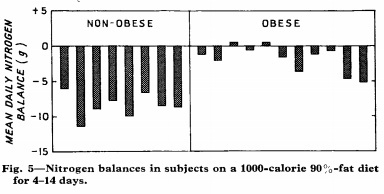Interesting study done in the era before George Cahill was able to show that fasting brains run mostly on Ketones. This study observed that Obese (hyperinsulinaemic) people don’t make many ketones and make ketones slower than lean people.
kekwick1959.pdf (386.0 KB)
They showed that the lower levels weren’t from obese people somehow utilizing or excreting more than lean people. That lean people see a drop in glucose when they make ketones that obese people do not. The other interesting (but incorrect) observation is that Obese people apparently make glucose from fat.
What they observed was that lean people who fast use more protein than obese people as evidenced by their nitrogen excretion.

I believe what they are observing is that Obese people have sufficient body fat to deliver more of the bodies energy requirements, defraying the need to use protein for energy.
Also that 10% of that fat drawdown becomes freely circulating glycerin which can be turned into new glucose defraying the need to use protein to make glucose for the brain.
Finally they were still under the impression the brain needed 144g of glucose, but the reality is with the liver making ketones from fat, the liver only needs to make 44g of glucose - which requires only 440g of fat to be burned (about a pound/day). And as long as someone has enough body fat to deliver that rate of energy their protein loss would be limited to protein required for maintenance.
